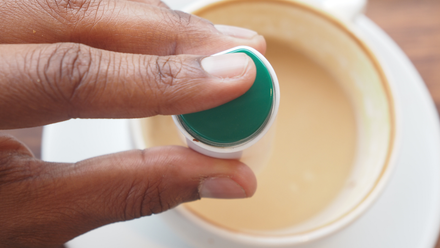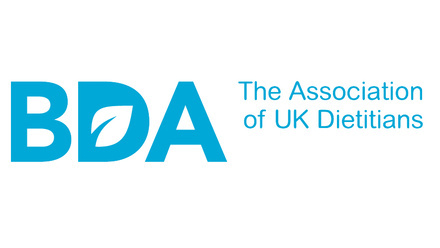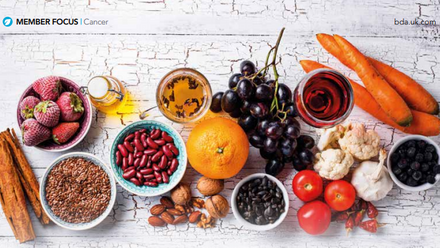Dr Duane Mellor takes a deeper look at aspartame, which has made the headlines in the last week as a 'possible cancer risk'.
We might have our own feelings and opinions about aspartame and other artificial, non-nutritive, or non-sugar sweeteners. However, recently there has been a lot of attention placed on these sweeteners and especially aspartame. The World Health Organization (WHO) has reported on its use in supporting people in managing their weight, its possible nature as a carcinogen and whether we should consider changing how much we consume.
What is aspartame?
Aspartame is a modified dipeptide (two amino acids), which consists of phenylalanine, aspartic acid, and methanol. People living with phenylketonuria, and their families and carers, need to be aware that aspartame in foods, drinks and other products will increase phenylalanine content, and therefore is best avoided.
Aspartame is often found in diet drinks. In the UK, most drinks have reduced sugar and contain sweeteners such as aspartame. It is also often found in diet yoghurts, tabletop sweeteners, chewing gums, some crisps and snacks, and toothpaste.
Developed in the 1960s and approved in the 1980s and 1990s for various uses, aspartame is about 200 times sweeter than sugar. When used as a tabletop sweetener it is often blended with maltodextrins to allow it to be sprinkled or formed into a small tablet. As its aftertaste is often somewhat bitter or metallic, it is typically blended with other sweeteners, most often acesulfame-K.
Aspartame has always been controversial, with lobby groups calling for restrictions on its availability. This led to research being funded by the Food Standards Agency to explore whether individuals who reported adverse effects and symptoms from consuming aspartame had any measurable biological or psychological effects.
This double-blind placebo-controlled study found no effects of aspartame intake in individuals who reported themselves to be sensitive to the sweetener.
Possible carcinogen?
In July 2023 the International Agency for Research on Cancer (IARC) published their findings, followed by significant media interest and a BBC Panorama programme which was highly critical of aspartame, sweeteners, and processed foods. This report classified aspartame as a possible carcinogen.
The IARC classifies substances (which include a range of foods, ingredients, compounds, and behaviours) into five categories.
Classification 1 includes things that are known to increase the risk and may cause cancer – such as smoking, alcohol, and processed meats.
Classification 2a includes things which probably cause cancer, such as red meat.
Classification 2b includes things that are possibly carcinogenic – this is where aspartame was classified along with aloe vera and caffeic acid (which is found in vegetables and coffees, which if anything is associated with a decreased risk of developing cancer).
Finally, classification 3 includes things that are not known to cause cancer.
Aspartame was classified as a possible carcinogen. But the three parts which make up the assessment were incomplete with respect to what the data was suggesting.
To make an assessment, IARC needs to look at the biological mechanism (how can something like aspartame change our biology to lead to carcinogenesis?)
Next there needs to be consistent data from animal studies (typically rats or mice) to assess if there is a potential causal and dose relationship between consumption and cancer. The final part is evidence from human studies.
In the case of aspartame, the biological mechanism is not entirely clear. Most of the animal data comes from one group in Italy and the human data with respect to liver cancer - which was the focus of the review and was not clear.
This led to the conclusion that there was no clear association between aspartame intake and risk of liver cancer – hence the classification of a 'possible carcinogen'. This is complex and nuanced, as it does not necessarily make aspartame sound safe. This approach recognises a potential hazard and then the risk - which from evidence in the case of aspartame, is very low.
The IARC report was joined by the Joint FAO/WHO Expert Committee on Food Additives (JECFA) report, which suggested that we did not need to change how much aspartame we consumed. This was based on the Acceptable Daily Intake (ADI) - the amount which has been determined to be safe from a toxicity point of view, which for a 70kg person would equate to nine to 14 cans per day.
So, it is clear that the WHO report from IARC and JECFA suggests that aspartame does not cause cancer, and any association is limited according to the available evidence.
But WHO does not recommend sweeteners?
Although not directly linked to aspartame alone, in May 2023 WHO created guidelines based on a systematic review which stated that non-sugar sweeteners are not recommended for weight control or to reduce the risk of non-communicable disease. This was based on a lack of data to support that the use of sweeteners resulted in weight loss or risk of communicable diseases.
This data was variable, with some intervention studies showing improvements in markers, but observational studies show less consistent and, in some cases, negative effects. This might be explained by reverse causality, in that individuals who have started to use sweeteners may already have a higher body weight or increased risk of non-communicable diseases, rather than sweeteners leading to these outcomes.
Sweeteners and the microbiome
This is an emerging area of interest which looks at the potential for sweeteners to influence the bacteria in our colon. Aspartame, as it is almost completely digested, absorbed, and metabolised in the jejunum, has not been shown to alter the gut microbiome. However, sweeteners which escape digestion such as saccharin and sucralose have been seen to alter the gut microbiome and have modest negative effects in some individuals on their glucose levels.
This data is perhaps not clinically relevant for most individuals, but does highlight that sweeteners might not be as biologically inert as previously thought, and may have the ability to lead to tiny physiological changes.
Summary
What might this mean? As is the BDA advice, the use of sweeteners should be considered on an individual basis. As some people enjoy sweet products including diet drinks, moving from sugars to sweeteners as part of a move to a healthier dietary pattern and lifestyle might be beneficial.
Perhaps rather than a simple swap of sugar to sweeteners, a more measured way to step down sugar intake using sweeteners to transition to a lower sugar, healthier and possibly less-sweet diet is perhaps a more sensible approach, rather than trying to avoid all sugar and sweeteners.






